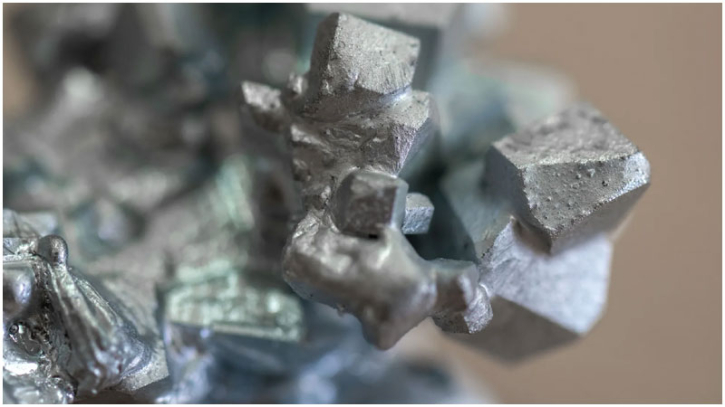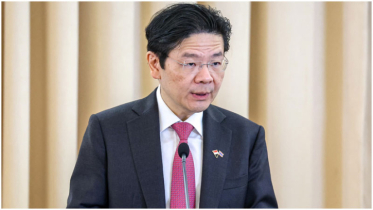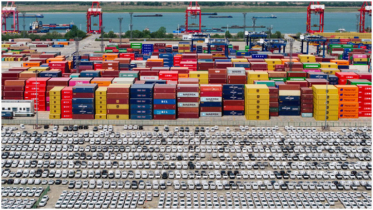China's rare earth export curbs expose US tech and defence sectors' vulnerability

China’s rare earth export curbs
As tensions continue to escalate in the ongoing US-China trade war, Beijing has taken a strategic step by imposing export controls on a number of rare earth minerals and magnets.
This move has revealed the United States' overwhelming dependence on these critical materials, sparking concerns over potential disruptions to its high-tech and defence industries, reports the BBC.
Rare earths, comprising 17 chemically similar elements, are essential in the production of various high-tech devices. While these elements are relatively plentiful in nature, extracting them in pure form is difficult and poses environmental hazards.
Elements like Neodymium are integral to making powerful magnets used in loudspeakers, EV motors, and jet engines. Yttrium and Europium are essential for colour displays in screens.
According to Thomas Kruemmer, Director of Ginger International Trade and Investment, "Everything you can switch on or off likely runs on rare earths."
In addition to consumer electronics, rare earths are vital in medical technologies like MRI scans and laser surgery, as well as advanced military hardware.
China currently dominates the rare earth supply chain.
The International Energy Agency (IEA) reports that it produces 61% of the global supply and processes 92% of it. The refining process, which separates rare earths from other materials, is both expensive and environmentally damaging. It also results in radioactive waste that many countries, particularly within the EU, are ill-equipped to manage.
"Radioactive waste from production absolutely requires safe, compliant, permanent disposal. Currently all disposal facilities in EU are temporary," added Mr Kruemmer.
China's dominance is the result of long-term strategic policies. In 1992, former Chinese leader Deng Xiaoping famously stated, "The Middle East has oil and China has rare earths," highlighting Beijing's early recognition of their strategic value.
Gavin Harper, a critical materials research fellow at the University of Birmingham, said, "Beginning in the late 20th century, China prioritised the development of its rare earth mining and processing capabilities, often at lower environmental standards and labour costs compared to other nations. This allowed them to undercut global competitors and build a near-monopoly across the entire value chain."
Earlier this month, China introduced new restrictions on exports of seven rare earth minerals, primarily "heavy" rare earths, which are more valuable and difficult to process than their "light" counterparts. These elements are critical to defence manufacturing.
As of 4 April, companies now require special export licences to ship these minerals abroad. The restrictions are part of China's rights under the Non-Proliferation of Nuclear Weapons treaty, which allows control over "dual-use" goods.
The Centre for Strategic and International Studies (CSIS) noted that the US is particularly vulnerable, as it lacks the capacity to process heavy rare earths outside China.
Between 2020 and 2023, China supplied about 70% of the rare earth compounds and metals imported into the US, according to a US Geological report. The new export controls could severely disrupt US manufacturing and defence production.
Heavy rare earths are used in military applications such as missiles, radar, and permanent magnets.
"The impact on the US defence industry will be substantial," Mr Kroemmer noted.
Defence systems, including F-35 fighter jets, Tomahawk missiles, and Predator drones all depend on these materials. CSIS further highlighted that China is advancing its weapons production five to six times faster than the US.
Dr Harper warned of broader consequences across the manufacturing sector: "Manufacturers, particularly in defence and high-tech, face potential shortages and production delays due to halted shipments and limited inventories. Prices for critical rare earth materials are expected to surge, increasing the immediate costs of components used in a wide range of products, from smartphones to military hardware."
President Donald Trump has ordered the US Commerce Department to explore ways to reduce dependency on imported rare earths and boost domestic production.
The presidential directive stressed: "President Trump recognises that an overreliance on foreign critical minerals and their derivative products could jeopardise US defence capabilities, infrastructure development, and technological innovation. Critical minerals, including rare earth elements, are essential for national security and economic resilience."
The US does have a single operational rare earth mine, but it lacks the capability to process heavy rare earths and currently sends its ores to China. Although the US led rare earth production until the 1980s, domestic companies exited the market as China undercut prices.
In an effort to find alternative sources, the US has expressed interest in securing minerals from other countries such as Ukraine and Greenland, which holds the world's eighth-largest reserves. Trump has previously expressed a desire to gain economic or military control over Greenland, although such attempts have faced international backlash.
"The challenge the US faces is two-fold," said Dr Harper.
"On the one hand, it has alienated China which provides the monopoly supply of rare earths, and on the other hand, it is also antagonising many nations that have previously been friendly collaborators through tariffs and other hostile actions. Whether they will still prioritise collaboration with America remains to be seen in the turbulent policy environment of this new administration."
.png)




